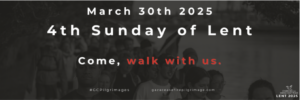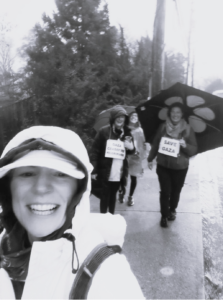
Fourth Sunday of Lent
March 30, 2025
Joshua 5:9-12 | Psalm 32 | 2 Corinthians 5:16-21 | Luke 15:1-3, 11b-32
Fourth Sunday of Lent Devotion
by Lydia El-Sayegh
It’s hard to sit still during a genocide. But it’s also hard to know where to move and what to do when every action I take feels ineffective. All is dark. There’s not a light to lead to escape. All I can do is feel around and grasp for any thin strands that might, perhaps, possibly help someone.
I imagine, reader, you’re with me in this darkness.
When we embarked on our Gaza Ceasefire Pilgrimage in Atlanta, I felt it was the very least we could do. A finite action just to say to our people in غزة, Gaza: “we feel with you, we ask for life and freedom with you”. An action just to repent of complacency1 and attempt to take up the ministry of reconciliation2. Just to walk in expectation of God’s saving intervention. Taking only one step for every person killed October 2023 – March 2024, our sixteen mile route of prayer at landmarks of faith and justice felt so small in comparison to the pain and loss two million Palestinians in Gaza have gone through daily.
Even as we conducted such a large action with unique spiritual meaning, it has been hard to see a change in the material conditions of people in Gaza. A ceasefire has taken too many months to materialize; even now as I write, it is precarious, temporary, redirecting the “fire” to the east3, and glaringly lacks foundation on any kind of arms embargo. I often think, “What effect of justice is this having? Are our walking and prayer this Saturday really going to make my grandmother feel better when she has nothing to eat and no home to return to? How does exercising my freedom to move and protest give anyone in فلسطين, Palestine their freedom?” Maybe you’ve had the same questions as you take actions to try to help Palestinians under genocide.
It’s taken a journey of many subsequent pilgrimages and of cultivating community (In Atlanta, we’ve continued to organize actions of a similar earnest character at the beginning of every month.) in order to discover that this practice calls me to believe in the power and mystery of prayer. While I am thinking, “What’s the point? As I pray, the days of genocide get worse,” my grandmother and her community pray the Psalms and meet for mass in St. Porphyrius Orthodox Church in the Zeitoun neighborhood of Gaza City. The Palestinian friends of one of my fellow pilgrimage organizers, Christina Remlin, believe in the power of and covet Christina’s daily prayers.4 And each time tragedy strikes in Gaza, survivors cry out “حَسْبُنَا اللَّهُ وَ نِعْمَ الْوَكِيلُ” (pronounced “hasbi Allah wa ni’mal wakeel,” a common saying in Arabic) which means “God is my portion and the best disposer of affairs” declared when all is taken away but God.4
Christina’s words resonate, “How dare I lose hope when they still find it? How dare I stop praying while they still believe?”
So, I follow the lead of my people in Gaza:
I pursue and trust in an Almighty and Merciful God.
I persist with صمود (sumud, steadfastness) because remaining as we are is not an option.
I pray.
And what’s exceedingly beautiful is that I learn to carry this sumud-filled prayer in community: In a cavern with no visible light for hope of a way out, Atlanta’s Gaza Ceasefire Pilgrimage and the community it generated are a practice in carrying our own very dim, small lights, collectively.6 On the long pilgrimage toward justice, community sustains us. In our earnest prayers, God meets us.1
1: I offer that, like the Prodigal Son in Luke 15, we have become complacent in our wealth at the expense of others. And like the Prodigal Son, we are driven back to the Father by hardship. …And like the Father, God meets us on the way.
2: 2 Corinthians 5:18; “reconciliation” in Greek (katallasso) implies “changing mutually” toward new creation. As you’ll read on, I’ve found that as we seek justice-driven changes in Gaza through pilgrimage and prayer, our pilgrimage and prayer change us.
3: As I write, Sundus Shalabi—a young woman near my age—and her unborn child have been killed in Tulkarem by Israeli snipers. https://zeteo.com/p/pregnant-palestinian-woman-killed-israel-media
4: I welcome you to support Christina’s friends here: https://chuffed.org/project/108980-help-a-young-family-evacuate
5: drawn from Surah Ali Imran 3:173, and reminiscent of Psalm 16:5
6: I credit Rev. Munther Isaac for inspiring this image of resistance in community!
Lydia El-Sayegh is one of the organizers for the Gaza Ceasefire Pilgrimage in Atlanta, Georgia, moving on land originally stewarded by the Cherokee and Muscogee peoples. Lydia’s heritage is in the Christian community in Gaza City, and she seeks to represent their ancient legacy and the community’s current needs in her advocacy. Beyond local multifaith activism, Lydia is trained as a biomedical engineer, and is a Master of Arts student of peace and justice with an interest in public health and health equity. She is the proud sibling of three.

To read the previous devotional click here: https://cmep.org/prayers4peace-3rdsundayoflent/
A printable PDF of all of this year’s Lent devotionals are available for download and printing HERE

